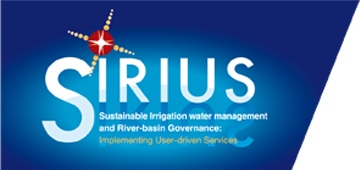Horizontal Issues
SIRIUS has identified several horizontal issues which cut across all the research and development activities of the Project. In each of these areas, the SIRIUS consortium has unanimously adopted an overarching policy and appointed a horizontal issues manager to oversee the development of the appropriate mechanisms to make sure that the project and the consortium follow a coherent approach.
Ethical issues:
The tools developed by SIRIUS are intended to benefit all stakeholders, but it is recognized that they could potentially reinforce social inequalities if used inappropriately. To guard against this, the project consortium continuously reviews the application of the project tools and their transfer to third parties to ensure compatibility with relevant European Union rural development and international cooperation goals.
Gender mainstreaming:
Gender issues are relevant in SIRIUS in several ways, all of which are addressed in the Gender Action Plan. Water management and Information and Communication Technologies have a significant gender dimension. Read more
SIRIUS addresses this by actively pursuing gender mainstreaming in all technical workpackages. The Gender Action Plan also provides the overall gender equality approach of the project and the initial guidelines of how to achieve an effective gender balance through positive actions.
In particular, the project will promote the UN and EU guiding principles on gender equality in every aspect of its application. This means that the consortium will address the gender imbalance that is currently prevailing in the research world of the academia with actions that show an effective increase of women researchers. At the same time it will also ensure that rural women in the case study areas will contribute to the research process in the stakeholder workshops and also benefit from the use of new technologies through training.
The Gender Working Group has been constituted. Its composition reflects a careful balance between women and men, technical disciplines, and pilot areas.
Quality and environmental management:
The SIRIUS consortium has a policy of continuous improvement of the quality of the outputs of the project and the continuous reduction of the environmental impacts of the project activities. The project Quality and Environmental Management System is based on a simplified version of ISO 9001 and 14001 standards. All project outputs are subject to internal peer review whilst quality and environmental impact are reviewed annually.
Training and education:
SIRIUS provides an opportunity to intensify the already ongoing exchange of students and scientists, in particular through a special mechanism for exchange of personnel. South-south exchange is especially encouraged. In the context of workpackages WP1, WP7, WP8 strategies for developing a training and education program will be outlined, possibly including new university curricula, aiming at forming a new generation of interdisciplinary water managers.
Knowledge management:
The approach follows the principles and techniques of Organic Knowledge Management. The coordinator acts to provide space, structures and opportunities for identifying and consolidating knowledge obtained through the project and to provide the incentives to encourage those patterns that emerge during the project that benefit the learning process.



